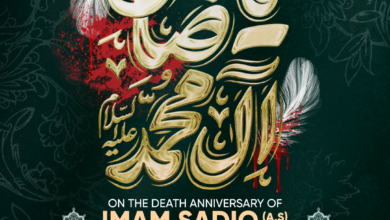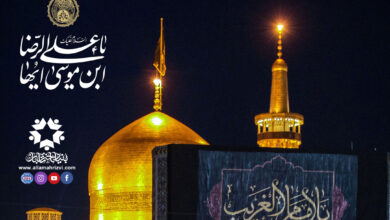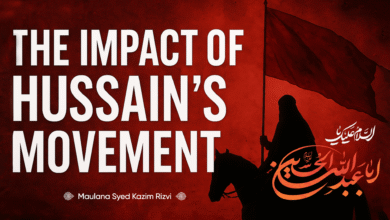The Prophet’s (PBUH) Campaign Against the Jews of Medina
Analysis by: Rais al-Muballigheen Allamah Sayyid Saeed Akhtar Rizvi
Preparation by: Hujjatul Islam Moulana Sayed kazim Rizvi
Contents
Expulsion of the Bann Nadhir (Rabi 1, 4 A.H.)
The Battle of Khandaq (Moat) or Ahzab
Elimination of the Bann Quraish
Introduction
The topic of “The Prophet’s (PBUH) response to the conspiracies of the Jews in Medina” refers to a complex series of historical events that occurred after the Hijrah. A more accurate and contextual translation from Islamic historical sources would be:
The reason for this is that these events were not a single “campaign,” but rather the result of repeated treaty violations and acts of betrayal and hostility by certain tribes against the Muslim community, which ultimately necessitated a decisive response to ensure the survival of the community.
The first instance was the expulsion of Banu Qaynuqa, as they were the first tribe to violate their treaty with the Muslims and show hostility after the Muslim victory at Badr. They were besieged and eventually exiled from Medina.
The second instance was the expulsion of Banu Nadir: This tribe was found to be involved in a plot to assassinate the Prophet Muhammad (PBUH). After a siege, they were also exiled from Medina.
One of the most significant confrontations was the Battle of the Trench (Al-Ahzab) and the incident of Banu Qurayzah: During the Battle of the Trench, the tribe of Banu Qurayzah violated their neutrality pact with the Muslims and conspired with the besieging Quraysh army. After the siege was lifted, their betrayal was addressed. Based on the ruling of an arbitrator from their own allied tribe, they were held accountable for their treachery.
In light of the aforementioned events and occurrences, it is imperative to gain a deeper understanding of these truths through research and historical analysis. The present text elucidates the key points from the historical books of Allamah Rizvi:
The Attitude of the Jews
For a long time, the Jews were masters of Medina. The tribes of Aws and money lending at exorbitant rates of interest was Khazraj (the Ansar) had settled there later. Gradually, these tribes gathered strength and equaled the Jews in power and prestige. The internecine war of the Bu’ath, however, weakened them, and the Jews again assumed ascendancy. The Jews were a prosperous people and one of their main occupations. With the deterioration in the economic situation of the tribes of Aws and Khazraj, many of them became heavily in debt to the Jews.
The position of authority and eminence, which their material superiority and strength gave to the Jews, received a big setback when Islam started spreading in Medina. They therefore, viewed the expansion of Islam with great disfavor and apprehension. Expediency had actuated them into entering into a pact with the Muslims, but soon they began plotting against Islam. They would distort the words and verses of the Qur’an and mock and jeer at the Muslims. Nevertheless, the Prophet was bidden to bear it patiently:
…. And you shall certainly hear from those who have been given the Book before you and from those who are polytheists much annoying talk, and if you are patient and guard (yourself against evil), surely this is one of the matters of great resolve. (Qur’an, 3:186)
The Prophet tried his best to maintain friendly ties with the Jews. The Qur’an stressed the fundamental unity between the two religions and asked the Jews to come to terms with the Muslims:
Say: O people of the Book! Come to a word common between us and you: That we shall not worship any but Allah and (that) we shall associate nothing with Him, and (that) some of us shall not take others for lords besides Allah, but if they turn back, then say: Bear witness that we are Muslims. (Qur’an, 3:64)
Neither kindness nor fair dealing on the part of the Prophet could, however, conciliate the Jews. They tried to revive the rift between the tribes of Aws and Khazraj. Some Jews would accept Islam one day and renounce it the next in order to show that there was nothing (important) in Islam.
And a party of the people of the Book say: Profess faith in that which has been revealed to those who believe in the first part of the day and disbelieve therein at the end of it, perhaps they will go back on their religion. (Qur’an, 3:72)
They conspired with the munafiqun and sent emissaries to the enemies of Islam. Apprehension and envy at the growing power of the Muslims following their victory at Badr rankled in their hearts, and they redoubled their efforts to exterminate the new religion. The Quraish were further instigating them to do so, sending a threatening epistle to them:
“You possess arms and fortresses. You should fight our enemy (Muhammad); otherwise, we will attack you and nothing will prevent us from grabbing the arms of your women.”
Ka’ab ibn Ashraf, a Jewish chieftain of Banu Nadhir, was a poet of considerable fame. Like so many others, he was bitterly hostile to Islam. With his fiery poems, he began to incite the people to rise up against the Muslims. After the battle of Badr, he composed a number of eulogies mourning the Meccan chiefs slain in the battle. He used to recite them at every gathering. He contacted Abu Sufyan with a view to making a combined effort to wipe out the Muslims.
He openly recited a number of poems derogatory to the Prophet. As poetry had a high place in the life of the Arabs and could deepen influence and sway feelings, Ka’ab ibn Ashraf had become not only a nuisance but a serious menace. We have it on the authority of al-Ya’qubi and Hafiz Ibn Hajar that Ka’ab plotted to kill the Prophet. When the Prophet knew this plot, he consulted his companions and it was decided that Ka’ab should be silenced forever. Muhammad ibn Maslamah undertook to carry out the job and, on getting an opportunity, he sent Ka’ab ibn Ashraf to hell.
The Banu Qinaqa’, the most powerful Jewish tribe, were the first to resile from the alliance with the Muslims. Says Ibn Sa’d, “The Jews attempted sedition during the battle of Badr and were envious of the Muslims, retracting from their pact with them.”
As mentioned earlier, an incident in 2 A.H. led to a flare-up. A veiled Muslim lady had gone to the shop of a Jew. She was pestered and her clothes thrown up. A Muslim standing nearby was unable to tolerate this indecent behavior, so he killed the Jew. The Jews, thereupon, killed the Muslim. The Prophet remonstrated with them but they defiantly replied that they were not (as weak as) Quraish (who were defeated in Badr) and would show him what battle was.
Within the security of their fortress, they started making preparations for war. The Muslims besieged the fortress for fifteen days and the Jews had to sue for peace, promising that they would accept the Prophet’s decision. The Prophet banished them, allowing them to take all their movable possessions to Syria. Some European critics see only the immediate cause, that is, the indecent behavior with the Muslim lady and, ascribing it to boyish prank, they try to minimize it. In their view, therefore, the punishment was too harsh, but they fail to take notice of the constant efforts of the Jews to undermine the Islamic movement. It was not one incident but a series of events that had brought on the final clash.
Expulsion of the Bann Nadhir (Rabi 1, 4 A.H.)
The banishment of the Banu Qinaqa’ enraged its sister tribe, the Banu Nadhir. Encouraged by the Meccans and by ‘Abdullah ibn Ubay, they plotted to kill the Prophet. Once the Holy Prophet, together with some companions, were there to seek their help in arranging the payment of blood-money of two persons from the tribe of ‘Amir. The Jews asked the Holy Prophet to come inside their fortress, but the Holy Prophet did not like the idea. Instead, he sat outside the wall of the fortress. They sent one man to climb the wall from inside the fortress and to kill the Holy Prophet by throwing a big boulder on his head.
The Holy Prophet, through divine revelation, came to know of this treacherous scheme in nick of time and immediately left the place.
Then he sent Banu Nadhir an ultimatum with Muhammad ibn Maslamah that, since they had broken their treaty, they should leave Medina in ten days. They wanted to migrate when ‘Abdullah ibn Ubay encouraged them not to leave Medina, promising them help with 2000 warriors. The Jews then refused to leave Medina. The following ayats refer to this promise of help:
Have you not seen those who have become hypocrites? They say to those of their brethren who disbelieve from among the people of the Book: If you are driven forth, we shall certainly go forth with you, and we will never obey anyone concerning you, and if you are fought, we will certainly help you, and Allah bears witness that they are most surely liars. Certainly, if these are driven forth, they will not go forth with them, and if they are fought, they will not help them, and even if they help there, they will certainly turn (their) backs, then they shall not be helped. (Qur’an, 59: 11-12)
Their fortress was besieged, and ‘Abdullah ibn Ubay did nothing to help them. After 15 days, they agreed to leave Medina. They were allowed to take away-`all their movables, which they could take except weapons of war.
They did not like the idea of leaving their houses to be occupied by the Muslims, so they demolished them. The Qur’an refers to the various aspects of this expulsion in Sura 59. For example, their migration and the destructing of their houses at their own hands is referred to in this ayat:
He it is who caused those who disbelieved from among the people of the Book to go forth from their homes at the first banishment, you did not think that they would go forth, while they were certain that their fortresses would defend them against Allah, but Allah came to them from where they did not expect and cast terror into their hearts: they demolished their houses with their own hands and the hands of the believers; therefore, take a lesson, O you who have eyes! (Qur’an, 59:2)
They passed through Medina’s market singing and beating drums to show that they were not disheartened by that banishment and that they would soon avenge this defeat. Some of them went to Syria while others settled with the Jews of Khaybar.
Since there was no war, according to the command of Allah (see Sura 59, verses 6 to 10), all the wealth left by them became the personal property of the Holy Prophet who, having consulted with the Ansar, distributed all movable property to poor Muhajirun and three poor companions from the Ansar: Sahl ibn Hanif, Abu Dajjanah and Zaid. He gave the immovable property to ‘All ibn Abi Talib (a.s.) who made it waqf (endowment) for the descendants of Fatimah (s.a.).
The 59th Chapter of the Qur’an (The Banishment) describes various aspects of Banu Nadhir’ s expulsion.
The Battle of Khandaq (Moat) or Ahzab
Upon settling down at Khaybar, the Banu Nadhir decided to seek revenge against the Muslims. They contacted the Meccans, and 20 leaders from the Jews and 50 from the Quraish made covenant in the Ka’bah that so long as they lived, they would fight Muhammad. Then the Jews and the Quraish contacted their allies and sent emissaries to a number of tribes. Banu Ghatfan, Banu Asad, Banu Aslam, Banu Ashja’, Banu Kinanah and Banu Fizarah readily responded and the coalition contributed ten thousand soldiers who marched upon Medina under the command of Abu Sufyan.
When news of these preparations reached Medina, the Holy Prophet consulted his companions. Salman al-Farsi advised to dig a moat on the unprotected side of Medina.
Muslims were divided into parties of 10, and each party was allotted 10 yards to dig. The Holy Prophet himself participated in this task. The khandaq (moat) was completed in nick of time: just 3 days before the host of the enemies reached Medina. The Muslims could muster only three thousand men to face this huge army.
Huyaiy ibn Akhtab, head of Banu Nadhir, met secretly with Ka’b ibn Asad, head of Banu Quraizah, a Jewish tribe still in Medina. Banu Quraizah, on his instigation, tore down the treaty, which they had concluded with the Muslims.
This treachery and danger from inside Medina, when Muslims were surrounded by the combined armies of pagans and Jews of all of Arabia on the outside, had a telling effect on the Muslims. As a meager safeguard, Salimah ibn Aslam was deputed with only two hundred men to guard the city from any attack by Banu Quraizah. The enemy was astonished to see the moat because it was a new thing for the Arabs. They camped on the outside for 27 (or 24) days. Their number increased day by day, and many Muslims were extremely terrified, as the Qur’an gives us the picture. Surah al-Ahzab describes various aspects of this siege. For example, see the following verses:
When they came upon you from above you and from below you, and when the eyes turned dull, and the hearts rose up to the throats, you began to think diverse thoughts about Allah. There, the believers were tried, and they were shaken a tremendous shaking. (Qur’an, 33:10-11)
At that time, many hypocrites, and even some Muslims, asked permission to leave the rank of the Muslims and to return to their homes:
And when a party of them said: O people of Yathrib! There is no place for you to stand, and a party of them asked permission of the Prophet saying: Verily our houses are exposed, and they were not exposed; they only desired to fee away. (Qur’an, 33:13)
The bulk of the army, however, steadfastly bore up the hardship of inclement weather and rapidly depleting provisions. The coalition’s army hurled arrows and stones at the Muslims.
Finally, a few of the Quraish’s more valiant warriors, ‘Amr ibn ‘Abdwadd, Nawfil ibn ‘Abdullah ibn Mughirah, Dhirar ibn Khattab, Hubairah ibn Abi Wahab, ‘Ikrimah ibn Abi Jahl and Mirdas al-Fahri, succeeded in crossing the moat.
‘Amr called for battle; nobody responded; he was considered equal to one thousand warriors. History accounts state that all the Muslims were as though birds were sitting on their heads: they were too afraid to raise their heads.
Three times did the Holy Prophet exhort the Muslims to give battle to Amr. Three times it was only ‘Ali who stood up. In the third time, the Holy Prophet allowed ‘Ali to go. When ‘Ali was going to the battlefield, the Holy Prophet said:
“The whole faith is going to fight the whole infidelity.”
‘Ali invited ‘Amr to accept Islam, or to return to Mecca, or to come down from his horse since ‘Ali had no horse and was on foot. ‘Amr alighted from his horse and a fierce battle ensued. For a while, so much dust covered both warriors that nobody knew what was going on. Once ‘Amr succeeded in inflicting a serious cut on ‘Ali’s head, yet after some time, ‘Ali killed ‘Amr. Concerning this battle, the Holy Prophet said:
“Verily, one attack of ‘Ali in the Battle of Khandaq is better than the worship of all human beings and jinns, up to the Day of Resurrection.”
This killing of ‘Amr demoralized the pagans, and all his companions fled away except Nawfil, who was also killed by’Ali.
The Muslims were short of provisions. The Holy Prophet had to tie a stone on his stomach in order to lessen the pangs of hunger. Abu Sa’eed al-Khudri said: “Our hearts had reached our throats in fear and desperation.” On the other hand, the besieging army was getting restive; it could not put up any further with the rain and cold; its horses were perishing and provisions nearing exhaustion.
The Holy Prophet went to the place where the Mosque of Victory (Masjid-ul-Fath) now stands and prayed to Allah. A fierce storm raged which uprooted the tents of the enemies; their pots and belongings went flying in all directions; an unbearable terror was cast in their ranks. The Meccans and the pagan tribes fled away. The first to flee was Abu Sufyan himself who was so upset that he tried to ride his camel without first untying its rope. This episode is referred to in the Qur’an in this Ayat:
O ye who believe! Remember the bounty of Allah unto you when came upon you the hosts, so We sent against them a strong wind and hosts that ye saw not: and Allah is seeing all what you do (Qur’an, 33:9)
And also in ayat 25 which says:
And God turned back the unbelievers in their rage; they did not achieve any advantage, and Allah sufficed for the believers infighting, and
Allah is Strong, Mighty. (Qur’an, 33:25)
Abdullah ibn Mas’ud was interpreting this ayat in (Tafsir ad-Durrul-Manthur) thus:
“And God sufficed the believers (through ‘Ali ibn Abi Talib) in their fight”
As a direct result of this defeat of the infidels’ combined forces in the Battle of Ahzab, the influence of the Quraish waned, and those, tribes who were till then hesitating to accept Islam out of their fear of Quraish began to send deputations to the Prophet. The first deputation came from the tribe of Madinah, and it consisted of four hundred persons. They not only accepted Islam but also were ready to settle down at Medina. The Prophet advised them to return to their homes.
Likewise, a deputation of a hundred persons came from the Ashja’ and embraced Islam. The tribes of Juhainah lived near them and were influenced by their conversion. One thousand of their men came to Medina and entered the fraternity.
Elimination of the Bann Quraish
According to the terms of the treaty which the Banu Quraish had contracted with the Muslims, they were bound to assist the Muslims against outside aggression. But, not to speak of assisting the Muslims or even remaining neutral, they had sided with the Meccans and joined the besieging foe. What was worse, they had tried to -attack the fortress where Muslim women and children had been lodged for safety. Living in such a close proximity to Medina, they had become a serious menace.
As soon as the siege of their own town was lifted, the Muslims surrounded the Banu Quraish’s fortress. For some time, they resisted but they ultimately opened the gates of their fortresses on the condition that their fate should be decided by Sa’d ibn Ma’adh, chief of the Aws. Basing his judgement upon the direction contained in the Old Testament itself, Sa’d ruled that the fighting men should be killed and their women and children made captive. The sentence was carried out. It was in this connection that the following Ayat’s were revealed:
And He drove down those of the people of the Book who backed them from their fortresses, and He cast awe into their hearts: some you killed and you took captive another part (of them). And He made you inherit their land and their dwellings and their properties, and (to) a land which ye have not yet trodden, and God has power over all things. (Qur’an, 33:26-27)
Many critics had described this punishment as harsh. But what other punishment could be meted out to them? They had violated the pact and, instead of helping the Muslims, they joined the forces of their enemies and had actually besieged the Muslims. There were no prisons where prisoners of war could be detained nor any concentration camps where they could be put to forced labor, and the capture of women and children, thought appalling to the notions of the present age, was probably the only method known in those days to provide sustenance to them when the earning members of their families had lost their lives. At any rate, this was the customary aftermath of a war.






